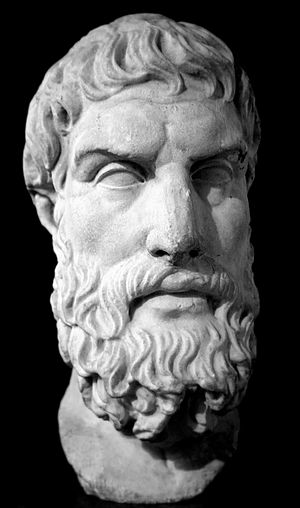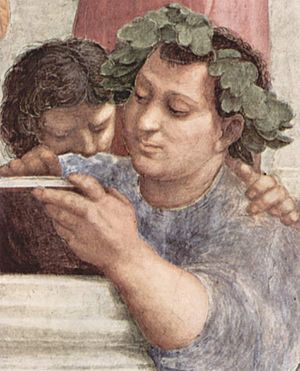Epicurus facts for kids
Quick facts for kids
Epicurus
|
|
|---|---|

Roman marble bust of Epicurus
|
|
| Born | February 341 BC |
| Died | 270 BC |
| Era | Ancient philosophy |
| Region | Western philosophy |
| School | Epicureanism, atomism, materialism, hedonism |
|
Main interests
|
Physics, ethics, epistemology |
|
Notable ideas
|
Pleasure principle, the "moving"/"static" pleasures distinction, ataraxia, aponia, atomic swerve |
|
Influences
|
|
|
Influenced
|
|
Epicurus (Samos, 341 BC – Athens, 270 BC) was an ancient Greek philosopher. He founded the school of philosophy known as Epicureanism that survived directly from the 4th century BC until the 4th century AD. He and his followers believed that the pursuit of pleasure and the avoidance of pain were the highest good. Epicureanism was one of the more popular philosophies of late ancient Greek and ancient Roman times.
Contents
Early years
Epicurus was born in February 341 BC on the Greek island of Samos to Athenian parents. His father, Neocles, was a schoolteacher. Epicurus began to study philosophy at the age of 14 under the Platonist teacher Pamphilus and was influenced by the teachings of Democritus, Aristippus, and Pyrrho, among others. At the age of 18 he went to Athens for his two-year term of military service.
Philosophy
Epicurus founded his first philosophical schools in Mytilene and Lampsacus before moving to Athens around 306 B.C.E. There, he founded The Garden, a combination of philosophical community and school. The residents of the Garden put Epicurus’ teachings into practice. The Garden was the first of the ancient Greek philosophical schools to admit women as a rule rather than an exception.
Epicurus was convinced that the gods did not interfere in human affairs and that death was nothing to be feared, as it was simply the end of consciousness. He also believed that the universe was infinite and eternal, and that everything was made up of atoms. Epicurus believed that the key to a happy life was to live in a state of tranquility and to avoid excess in all things. He taught that the pursuit of wealth, power, and fame was ultimately fruitless and that true happiness could only be found in simple pleasures, such as friendship, good food, and intellectual pursuits.
Difference from other schools of thought
Epicurus' philosophy differed in several ways. Unlike the Stoics, who believed in living in accordance with nature and accepting one's fate, Epicurus believed that the pursuit of pleasure and the avoidance of pain were the keys to a happy life.
Unlike the Cynics, who believed in living a simple and ascetic life, Epicurus believed that pleasure should be sought in moderation and that simple pleasures, such as friendship and intellectual pursuits, were essential to a happy life.
Unlike the Platonists and Aristotelians, who believed in the existence of an objective reality, Epicurus believed that everything was made up of atoms and that the universe was infinite and eternal.
Ethics
Epicurus based his ethics on a hedonistic set of values, seeing pleasure as the chief good in life. He believed that the ultimate goal of human life was to achieve happiness and that happiness was achieved through the pursuit of pleasure and the avoidance of pain. Epicurus believed that pleasure should be sought in moderation and that excessive pleasure-seeking could lead to pain and suffering. He also believed that true happiness could only be achieved through friendship and that peace of mind and mental well-being could be achieved through philosophy. Epicurus did not place much emphasis on community virtues such as justice and societal good, but rather focused on individual pleasure and happiness.
The Epicurean paradox
The Epicurean Paradox is a philosophical argument that questions the existence of God based on the problem of evil. The paradox states that if God is all-powerful and all-good, then why is there evil and suffering in the world? The argument has been used to challenge theologians and philosophers for centuries. The paradox has been the subject of much debate and has been addressed by various philosophers throughout history.
Writings
Epicurus was a prolific writer, amassing 37 volumes of works. Unfortunately, only fragments and four letters remain. Some of his surviving works include "Letter to Menoeceus," "Principal Doctrines," and "Vatican Sayings", preserved in a manuscript from the Vatican Library that was first discovered in 1888. These works contain his philosophical ideas on the pursuit of pleasure, the avoidance of pain, the nature of the universe, and the role of the gods.
Personal life
Epicurus never married and had no children. He believed that friendship was one of the most important aspects of a happy life. He valued friendship above marital relationships and believed that true friends should be able to share everything with each other. Epicurus was convinced that marriage was not necessary for happiness and that it was better to be happily unmarried or divorced than unhappily married. He thought that marriage was never any good to a man and that the wise man would never marry or beget children.
Death
Epicurus died at the age of 71. The cause of his death was a stone blockage of his urinary tract that had troubled him for a long time. In an era when urinary tract surgery was considered to be an extraordinary means of treatment, Epicurus peacefully passed away, firm to his own teachings about tolerance to disease and pain.
Legacy

His teachings were often controversial and were met with both admiration and criticism. Some people saw him as a radical thinker who challenged traditional beliefs about the gods, death, and the pursuit of pleasure. Others saw him as a dangerous influence who encouraged people to indulge in hedonism and reject traditional moral values. Despite the controversy surrounding his ideas, Epicurus' philosophy had a lasting impact on Western thought and continues to be studied and debated by philosophers today.
Images for kids
-
Allocation of key positions and satrapies following the Partition of Babylon in 323 BC after the death of Alexander the Great. Epicurus came of age at a time when Greek intellectual horizons were vastly expanding due to the rise of the Hellenistic Kingdoms across the Near East.
-
Reconstruction by K. Fittschen of an Epicurus enthroned statue, presumably set up after his death. University of Göttingen, Abgußsammlung.
-
Illustration from 1885 of a small bronze bust of Epicurus from Herculaneum. Three Epicurus bronze busts were recovered from the Villa of the Papyri, as well as text fragments.
-
The most famous version of the problem of evil is attributed to Epicurus by David Hume (pictured), who was relying on an attribution of it to him by the Christian apologist Lactantius. The trilemma does not occur in any of Epicurus's extant writings, however. If Epicurus did write some version of it, it would have been an argument against divine providence, not the existence of deities.
-
Dante Alighieri meets Epicurus in his Inferno in the Sixth Circle of Hell, where he and his followers are imprisoned in flaming coffins for having believed that the soul dies with the body, shown here in an illustration by Gustave Doré.
-
The French priest and philosopher Pierre Gassendi is responsible for reviving Epicureanism in modernity as an alternative to Aristotelianism.
-
Bust of Epicurus leaning against his disciple Metrodorus in the Louvre Museum
See also
 In Spanish: Epicuro para niños
In Spanish: Epicuro para niños









